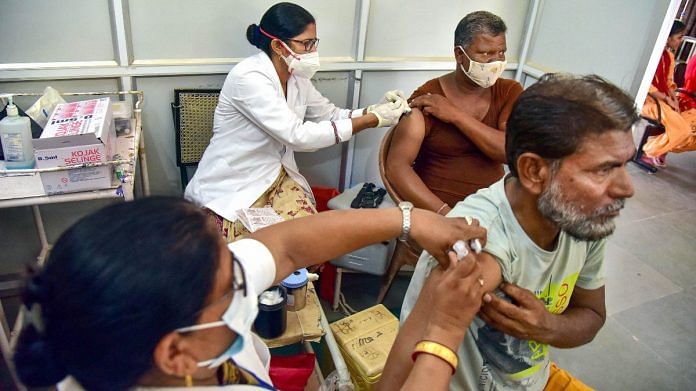New Delhi: The latest government report on Adverse Events Following Immunisation (AEFI) with Covid-19 vaccines has found that 61 per cent of the events analysed were causally related to vaccinations. However, none of these was fatal, i.e. resulted in death, the report says.
The report concluded: “48 out of 78 cases for which causality assessment has been done were found to have consistent causal association to vaccination. Of these 48 cases, 28 cases were vaccine-product-related reaction and 20 cases were immunisation anxiety related reaction. 22 cases have inconsistent causal association to vaccination (coincidental — not linked to vaccination), including 7 death cases. 7 cases were in indeterminate category including 2 death cases. There was 1 death case in unclassifiable category.”
Vaccine-product-related reactions are, as the name suggests, reactions that can be causally related to the vaccine. These are usually documented, and include fever, body ache, allergic reactions and anaphylaxis. However, the committee assessing AEFI does not usually look at minor reactions such as fever and body ache, but at serious adverse events.
Indeterminate reactions are reactions that have occurred soon after vaccination but, based on available scientific evidence, cannot be causally linked to the shot. Instead, the establishment of that link needs further study. Unclassifiable events are events on which a conclusive verdict could not be reached as necessary information was not available.
Coincidental events are those that are reported following immunisation but for which a clear cause other than vaccination can be found on investigation.
All the post-vaccination events that were analysed were either after administration of Covaxin or Covishield. Though India also uses Sputnik V, the numbers are very small.
According to the report: “Overall, the benefits of vaccination are overwhelmingly greater than the small risk of harm. However, as a measure of utmost precaution, all emerging signals of harm are being constantly tracked and reviewed periodically.”
Members of the AEFI committee of the National Technical Advisory Group on Immunisations pointed out that reporting of adverse events in India is not very robust and therefore not only is there a time lag in the report, it is also possible that many such events, including possibly serious ones, go unreported.
Also read: 176 recipients died in 71 days of India’s Covid vaccine drive, but no direct link found
Long gap in releasing report
The AEFI committee looks only at serious adverse events and analyses them for possible links to the vaccine in question.
The aforementioned report gives the conclusions derived by the committee at its meeting on 3 August. Though the analysis is an ongoing process, the report comes after a fairly long gap; the last report was dated 12 July. Since then, over 48 crore vaccine doses have been administered throughout India.
“The reports keep coming in but it is the analysis that takes time. One has to meticulously go through all the records, sometimes call for documents from the hospital. Often they are not very prompt in supplying the documents asked for, so you need to follow up. The analysis is the key. Unanalysed reports should not be made public because people may misunderstand, may misinterpret the risks,” a senior health ministry official told ThePrint when asked about the delay.
(Edited by Manasa Mohan)
Also read: Why 25-50% of vaccine side-effects are ‘anxiety-related and not a result of Covid jab’



